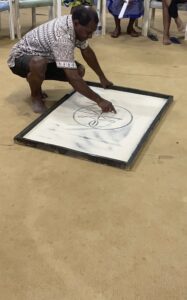Vanuatu is a cluster of islands in the South Pacific and home to the Gud Nius Yunivesiti Felosip (GNYF), our IFES movement. Most of our country is still populated by small, subsistence-farming communities, and only a tiny portion will ever be involved in tertiary education (<1%). Many students will come to university having grown up in churches their whole lives, but still unsure of how to listen carefully to God’s Word and sometimes unclear on exactly who Jesus is or why our love, trust, and knowledge of him is vital. Even at the tertiary level, our students don’t really enjoy sustained engagement with written texts, preferring to hear and talk about what matters.
We wanted to devote a year to intentionally sharing the gospel with our friends and classmates on campus in ways that fit the relational nature of the islands and the strong oral preference in learning, as well as helping people engage with Jesus by piercing through the ‘church background noise’. We decided on a Melanesian version of ‘Uncover’ (a well-received gospel distribution project) called ?Huia Jisas?—Who is Jesus? While this focused mainly on students sharing stories from Mark with other students, we also planned some key public events that would connect our networks with the wider university community in a ‘Vanuatu’ way.
One of the traditional ways of imparting knowledge in Vanuatu is sandroing (or bwatiuli in the Raga language from Pentecost Island). This involves making patterns in the ground with a finger to leave messages, share information, or pass on significant stories. Our idea was to use this local artform to convey the gospel stories we wanted our friends and classmates to hear. We connected with a local bwatiuli expert, Uncle Edgar, to develop four new patterns that reflected four themes from those gospel narratives: sin, forgiveness, reconciliation, and rule.
After a few weeks of reading and discussing the Mark narratives with Uncle Edgar, we presented these new patterns during a special event at our regional university campus. Our staff worker and students told four key stories from Mark, then Uncle Edgar introduced us to a traditional-style story and song he’d composed. It described two people (representing us and God) in a relationship that had broken but been reconciled. As he played the bamboo flute and shared each part of the story, he carefully drew the complex arcs and shapes representing the characters and concepts of what was being told.
As far as we (or Uncle Edgar) know, this is the first time that sandroing has been used in collaboration with and to share the Scriptures. He is excited to take these stories and patterns to his church so that Vanuatu can hear—and see—the good news of Jesus, settled in their hearts and etched in their land.
Tag Archives: small group Bible study
The Beauty of Discovery Bible Study
In TAFES (Tanzanian National Movement), Discovery Bible Study (DBS) is one of the approaches we use, and it has captured the hearts of many students and associates!
We utilise DBS for small group study by following this simple process:
- one member reads the passage and
- the group retells the story (passage), then
- we answer a few main questions together; these are:
- What have I discovered about God?
- What have I discovered about people?
- How do I obey God through this Word?
- Who I am going to tell?
How did it start?
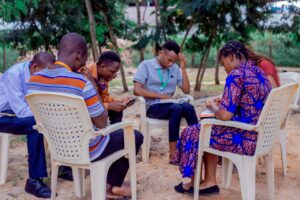 It was during a staff retreat in February 2021 that our Campus Ministry Coordinator, Sister Joan Wanjiru, proposed trying the DBS method to see if it would be suitable for training students. We used DBS for the first time at that retreat and later in Discipleship
It was during a staff retreat in February 2021 that our Campus Ministry Coordinator, Sister Joan Wanjiru, proposed trying the DBS method to see if it would be suitable for training students. We used DBS for the first time at that retreat and later in Discipleship
Training Seminars (DTS) throughout the country. After the success in 2021, we repeated this study technique during DTS in 2023. Although Inductive Bible Study and Manuscript Bible Study are still in use, DBS has become the most loved and practised approach by many Christian Unions since its introduction.
Uniqueness of DBS:
There’s something special about Discovery Bible Study and its popularity is fostered by these unique advantages:
- Easy to teach and practice. Understanding how to use DBS requires simple training. The discovery questions (above) are easy to remember, making it accessible, even if it’s a person’s first time.
- Importance of application. The practice of DBS is not complete until a person specifically addresses the question of how they will obey the Word that is being studied.
- Tool for evangelism and discipleship. Through DBS, there’s always an increase in the number of people coming to Christ and the growth of members’ spirituality. Using this method of study with a non-believer may draw them to Christ and provides an opportunity for members to tell others about the Word of God.
- Connects people in the group. Since DBS preserves the principle of small groups, participants get to relate to each other beyond just discussing DBS questions.
Jusline C. Nkala, treasurer TAFES KIUT CU:
“It was amazing during DTS 2023 when we used this method to study the book of 1 Samuel. DBS is one of my good and best methods that I have encountered in terms of Bible study because we stay in a group and read the Bible story together, we discover what Scripture says about God and people, and we challenge ourselves to live according to the Word and share the Word with our friends”.
Tumaini Titus
Regional coordinator – TAFES Tanzania
From Caribbean region: The Artistic Bible Study Method
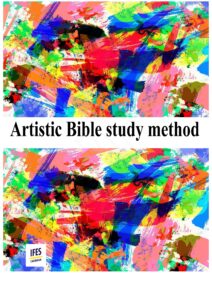 I am happy to share with you an approach we use in the CARIFES region called “The Artistic Bible study method”. It was developed to guide students into the Scriptures from an artistic point of view.
I am happy to share with you an approach we use in the CARIFES region called “The Artistic Bible study method”. It was developed to guide students into the Scriptures from an artistic point of view.
This way of reading can help participants appreciate the details of a passage, while learning to communicate that appreciation in a creative and easy way. What remains of central importance is that we are engaging in the process of exploration. As an additional benefit, students may discover a new talent and enjoy the experience.
However, allow me a few words of caution before explaining this method further. While it is good, this approach may not be adequate in all cases, and it is the leader’s responsibility to manage the choice of texts accordingly. The goal is for participants to respond to the Bible passage using multiple senses and from different perspectives, increasing the possibilities for more comprehensive appreciation of the material. As it is not a rigid method, variations can be tested and implemented.
Regarding the tools needed, every participant should have paper, pencils, and pens in different colours. If tablets are available, these could also be used.
In the first stage, participants must explore and focus on the chosen text for 5 minutes. This time allows each person to consider their understanding of the passage and how they might express that understanding in their drawing. After this, participants should be given enough time to recreate their ideas on paper and share them with the group.
Some questions that can prompt reflection and creative response include:
– Are there any keywords that catch my attention?
– What is clear or not clear?
– What relevant information or important events do I see in the passage?
– What does this mean and how is this speaking to me?
When everybody has shared and explained their drawings, there is an opportunity for what we call “Debate”. Every participant will share one thought about each drawing, considering questions such as:
– Which drawing speaks to you? Why?
– What is your favourite? Why?
– What would you do differently?
Finally, we have what is called “Go Further”. In this stage, participants have the chance to draw something new about the passage and explain what about it is different and why. As an alternative to the ‘’Debate’’, after finishing their first drawings, the group can study the text using the traditional method of ‘’Observation, Interpretation, and Application’’, after which they should complete a second drawing for discussion.
We have tested this method during a training session with students in the region and, according to the survey taken at the end of this training, it was their favourite part. I was impressed with how clearly their drawings expressed the students’ understanding of the text, but also how diverse and rich lessons from the same text can be.
Jean-Davy Frair
CARIFES regional staff team as a Francophone Staff
Connecting Scripture Engagement (SE) and Prayer
In December 2019, the global network of Scripture engagement (SE) multipliers met – fourteen people from around the IFES world. During this meeting, we had a work group on SE and prayer with the following participants: Eu Pui Chong (EP, Malaysia), Irena Huseva (IH, Ukraine), Heledd Job (HJ, Europe), Sabine Kalthoff.
Please start by looking at the summary of our findings on SE and prayer:

The following interview with the work group participants brings life to some aspects of this overview:
What is one new insight that you gained from this work group about the connection between SE and prayer?
(EP) Often, we study a passage and after that we pray for each other ‘leaving behind what we just discovered from the passage’ instead of letting the passage guide our prayer needs or shape our prayer items.
(IH) The importance of a prayerful posture in studying Scripture. For me that is not just putting my body in a certain posture, but becoming quiet before him and putting my hand into his to let him lead and walk with me through the whole Scripture Engagement. In other words, being in a prayerful posture means being in prayer before, during, and after the Bible study.
(HJ) I gained a greater awareness that when I come to engage with Scripture by myself or with others, God is present with me in that very moment. The phrase that stuck in my mind is: The author is in the room”.
What encourages you and what challenges you as you reflect on this connection?
(EP) In particular, the Lord’s prayer has been invaluable – praying for my nation and the world has been difficult in this period due to what I perceive as an endless cycle of corruption power abuse. Letting the words of the Lord’s prayer lead me has been comforting. It also challenges me not to give up praying, seeing how God is at work and not to insist that God solve problems my way or in my timing.
(HJ) This connection encourages me as I come across passages that I find difficult. As I’m reading and struggling, I can pause and ask for God’s help. I can ask him, what do you mean? What do you want me to understand here? What should I do with this? And I know that when I pray, the Spirit who caused these words to be written is there present with me, ready to answer.
What is one practical step that you have taken or would like to take in order to strengthen the integration of SE and prayer in your own life and/or ministry?
(IH) For many years, I studied Scripture by carefully observing the passage, asking questions and trying to grasp its main message. Only after coming up with the main message did we ask ourselves what it says to us. I still use this approach, but I try to be in a prayerful posture during the whole Bible study, letting the Word speak to me not only at the end of the study, but while I am deeply in it. I believe that the Holy Spirit can use not only the main message of the passage, but any parts of it to touch our soul.
(HJ) In my personal devotions, I have tried to be more intentional in praying in response to what I read. At the moment, I’m reading through the Psalms. I try to take the words of the Psalmist as my starting point, taking those words and thoughts and making them my own. Then at the end of the day, I will return to that same Psalm and prayerfully reflect on how what I heard God say to me in the morning has been sustaining and directing me throughout the day.
Please complete the following sentence: “The gift of SE and prayer is…”
…waiting to be discovered and savoured. (EP)
…being amazed – a sense of wow at who God is, wow to who I am and wow to his boundless love. (IH)
…that when God speaks he is not just giving us information, he is inviting us to a conversation. (HJ)
Connecting Scripture and Prayer in Practise:
_Preparing to hear the Word. Most of us cannot just stop and listen to God. We sit down and open the Bible to read, but our thoughts are still elsewhere, busy with lots of things. We read a passage and at the end, we don’t know what we’ve read. We can read without hearing. I know that I need to prepare myself to listen to God. I need help to be present to him and his Word. What helps me most is prayerful silence.
How do you prepare yourself to hear the Word both individually and in a group? Prayer helps us enter into a relational posture and awareness of God’s presence.
_Praying the Word – God’s Word teaches us how to pray. We can let prayers from Scripture inspire and lead us in our prayers – both collectively and individually. This video shows what this can look like based on the Lord’s prayer. This article gives further examples of how God’s Word can shape our praying.
_Learning to lament from Jeremiah. After the Covid 19 pandemic started, the Latin American region offered an online session on the topic of lament. For follow up, a resource with three Bible studies from the book of Jeremiah was developed – giving examples of how to lament, helping to reflect on lament and inviting to pray to God in this way ourselves.
_Retreats are all about prayerfully connecting our lives with God’s reality and his Word. They are an invitation to retreat from the business of life, to enter into a time of waiting and listening – holding out our lives and circumstances to God – hearing his Word – and prayerfully giving the Spirit space to speak to us. You can find material for personal or group retreats here. This testimony helps see the value of setting apart such a time.
There is so much more for you to discover… maybe this summary image can serve as a road map on the way. Please do write and share your experience of integrating Scripture and prayer – in your personal lives, but also in communal settings, at camps and conferences. We would love to hear back from you.
Sabine Kalthoff,
IFES Secretary for Scripture Engagement
sabine.kalthoff@ifesworld.org
From fear to hope
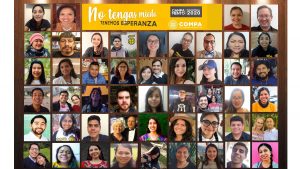 COMPA had scheduled its highly expected National Student Gathering for April 2020. COVID-19 had already ruined some of my plans and turned my last year as a university student upside down. On March 30th, the Mexican health authorities declared a national lock-down and I went from an on-campus student to an on-line student overnight. What would happen to my plans, my dreams, and my goals for this year? Everything was getting cancelled and it was both sad and frustrating. However, I was able to see God’s hand because my family was healthy, and we had resources.
COMPA had scheduled its highly expected National Student Gathering for April 2020. COVID-19 had already ruined some of my plans and turned my last year as a university student upside down. On March 30th, the Mexican health authorities declared a national lock-down and I went from an on-campus student to an on-line student overnight. What would happen to my plans, my dreams, and my goals for this year? Everything was getting cancelled and it was both sad and frustrating. However, I was able to see God’s hand because my family was healthy, and we had resources.
COMPA announced that they would hold the National Camp online. I was very happy to read that and, at the same time, I felt sad that I wouldn’t be seeing my friends from across the country in person. God surprised me by showing me that He gave us a community despite the distance and these convoluted times. Nearly 1,000 people registered and 700 signed up for on-line Bible studies.
When I was asked to host a Bible study, I accepted and I was more than willing to collaborate since I had a bit of experience in on-line Bible studies, as part of the Student National Convention. However, when I learned the book was Revelation, I felt intimidated as it seems hard to read. We were invited to a 3-session orientation event for 50 Bible study leaders. At the first session, we took a trip down this enigmatic book; in the second, we attended an on-line Bible study; and in the third, they expounded on the methodology.
The book of Revelation then went from a daunting text to a ray of hope in times of uncertainty. I loved stepping into their shoes, and, in a certain way, I felt identified with them. As a student, I like to have everything at hand and under control, but I had lost sight of the essential need to love Jesus deeply.
I grew in my love for the Lord because I saw that Jesus was with us in the midst of these new circumstances. This orientation was key, we had visual aids and a guide to manage time, as well as teaching tools.
Back then, hardly any of us were used to using ZOOM, but they made an effort. Although it was a long-distance call, we felt safe because we were connecting around the Bible. We were all afraid of studying the book of Revelation and we needed hope, and God gave us this hope through this enigmatic book. It was great because it was a true introduction to developing our mission on-line during these semesters. God is sitting on His throne and He has surprised us in the midst of this time of uncertainty by providing us with trust and hope.
Zuriel Castro/ Business Management / COMPA Mexico
Bible Study Bookmarks for Different Genres of Scripture
In many Bible study groups, the following thing happens: you come together and read a Bible text. After a short moment of silence, somebody brings up his or her favorite topic that is vaguely connected to the text. This might be predestination, baptism or world politics. All these topics are important, but the purpose of the meeting gets lost – that is, to share around a Bible passage and let God speak to you.
At the IFES World Assembly 2015 in Mexico, I got to know the Intervarsity USA Bible study bookmark that guides through an inductive Bible study. Back in Germany, I translated it into our context. It was great: the students concentrated more and dug deeper into the text with the guidance of the bookmark.
As long as we read the Gospels, it worked quite well. Yet as we studied other types of biblical texts like prophetic, poetic or apocalyptic literature, it became more difficult to work with the bookmark. It was, for example, problematic to read Old Testament law as we read the Gospels – we couldn’t simply apply the law directly to our life. Some students asked: “Why should I follow Jesus and not the whole Old Testament law? Both are in the Bible and come from God…? And what about the psalms that talk about vengeance? Doesn’t Christ call us to love our enemy?”
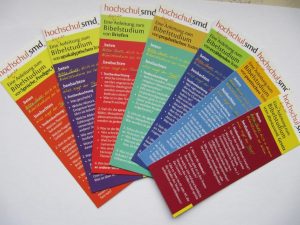 We realized that we need different kinds of questions for different literary genres in Scripture. When reading narratives, we observe what the different characters say and do, how events evolve and how God is at work in the midst of this. When reading prophetic texts, observation is more about asking what social, ethical or religious wrongs are being addressed. Poetic texts often use imagery to convey their message and so we need to give them appropriate attention. Similarly, the questions we ask in interpretation will differ from one kind of biblical text to another.
We realized that we need different kinds of questions for different literary genres in Scripture. When reading narratives, we observe what the different characters say and do, how events evolve and how God is at work in the midst of this. When reading prophetic texts, observation is more about asking what social, ethical or religious wrongs are being addressed. Poetic texts often use imagery to convey their message and so we need to give them appropriate attention. Similarly, the questions we ask in interpretation will differ from one kind of biblical text to another.
After a while, we developed Bible study bookmarks for seven different genres: narratives, epistles, prophetic passages, poetic texts, Old Testament law, wisdom literature and apocalyptic literature. For each genre, the questions suggested for the Bible study correspond to the theological and literary characteristics of this type of text. You can find them here.
With regard to these bookmarks, Markus Heide – head of SMD student ministries – says: “I experience their value when they help student groups to unearth the treasure of Scripture instead of only hearing what they already know. I experience their value when they help a Christian to read the Bible with a non-Christian friend and together they make discoveries, instead of the Christian explaining everything to the non-Christian.”
Fabian Mederacke, former regional staff of SMD Germany
fmederacke@gmx.de
One Bible Study Multiplied into Many
 As a student, I had the opportunity to join a Bible Study group, in addition to our weekly FES fellowship meetings. We met once a week during the semester. We named the group “Bible Surgeons” because we wanted to dissect the Word, discover it and process these discoveries in our lives. We did not just want to hear the outcome of someone else’s study, but engage with Scripture ourselves. These studies taught me to look at biblical passages through the eyes of different people, perspectives and entry points. This has been a great gift for me in my discovery of God and his Word.
As a student, I had the opportunity to join a Bible Study group, in addition to our weekly FES fellowship meetings. We met once a week during the semester. We named the group “Bible Surgeons” because we wanted to dissect the Word, discover it and process these discoveries in our lives. We did not just want to hear the outcome of someone else’s study, but engage with Scripture ourselves. These studies taught me to look at biblical passages through the eyes of different people, perspectives and entry points. This has been a great gift for me in my discovery of God and his Word.
Our FES staff worker, Annette Arulrajah, facilitated the Bible Surgeons’ group. Through this experience, I learned to lead Bible studies. As a student, I mainly observed how Annette facilitated. This wasn’t difficult because she would explain the reason behind why she did certain things, even if she had to repeat it weekly! In this way, we studied biblical books and at the same time learned to facilitate studies. I learned from Annette that you can facilitate Bible studies with 1 person or with 100 people. I discovered that engaging with the Word can be interesting, interactive and alive. I think the most valuable thing I learned is how to lead a Bible study in such a way that students learn how to study the Word for themselves and are enabled to facilitate a Bible study for others.
What inspires me to continue facilitating Bible studies with others is the desire to see students discover for themselves who God is through His Word. Since the Word is alive and still speaks to us, it can pierce our heart and draw us back to God – if we allow it to. I have often seen students so moved by the Word that the door for deep conversations was opened and new steps of faith were taken. For me, it is always important to remember that when I mentor a student, I do not do so with my words, but with God’s Word.
For eleven years I have been facilitating Bible studies and training others to do so. I thank the Lord that because of this, many students in turn have started to facilitate Bible studies!
Beatrice Leong, beascuits@gmail.com
staff worker FES Malaysia until 2018
Empowering students to study the Word
Listen to the testimony of one of the student participants in the FCSI Israel Bible Study Conference:
“Last year, I faced the most difficult circumstance in my life – the loss of my mother after a long battle with cancer. She was my best friend, my role model, my source of support and the greatest blessing God has ever given to me. I could not imagine my life without her. When I went to the conference, she had stopped responding to treatments and her condition was deteriorating very fast. At this Bible study conference, we studied the story of Jesus calming the storm; through it, Jesus met my paralyzing fears, sorrow, and brokenness and calmed the raging storms within me. His strong presence and overwhelming peace embraced me, carried me above this crushing situation and helped me overcome what seemed to me insurmountable.”
 Our vision for the Mark Manuscript Bible Study Conference started in 2014; we wanted to see students who are both passionate about the Word and who know how to study and engage the Scriptures. We wanted students to meet Jesus through his Word and be transformed from within. Yet, the reality showed that our students were lacking the tools to study the Bible as individuals and with one another. So our desire was to offer them a study method which can help them feel comfortable studying the Bible with their friends and within their student groups. We believed that through this our students would also have the courage to start inviting their non-Christian friends to study the bible with them, offering them the chance to meet Jesus in his Word.
Our vision for the Mark Manuscript Bible Study Conference started in 2014; we wanted to see students who are both passionate about the Word and who know how to study and engage the Scriptures. We wanted students to meet Jesus through his Word and be transformed from within. Yet, the reality showed that our students were lacking the tools to study the Bible as individuals and with one another. So our desire was to offer them a study method which can help them feel comfortable studying the Bible with their friends and within their student groups. We believed that through this our students would also have the courage to start inviting their non-Christian friends to study the bible with them, offering them the chance to meet Jesus in his Word.
As we look back at these beginnings, we are filled with gratitude and joy to see God’s vision for the Christian students in Israel unfold. When we first invited students to meet Jesus through the book of Mark at this conference, less than 20 students committed to joining us. This year we had the third consecutive annual conference – for the first time, we had 110 participants altogether! Students have been sharing how this conference has shaped their faith and given them new eyes to see Scripture. More and more students are reading the Bible, leading to noticeable change in their personal lives.
Our prayer is to see the love of the Scripture and the passion we are witnessing among our students influencing the body of Christ in Israel.
Rasha Saba, rasha@fcsi.ws
Arab students’ ministry and training coordinator FCSI Israel
The Joy of Studying the Bible with Seekers
I believe that seeker Bible studies are the single most effective way to show Jesus to a friend. God is not a message or a theory, but a person. And this person is made known to us by the gospel stories.
 The Italian context in which I live is characterized by suspicion and skepticism. It surprises me that in this context more seekers than I would have expected are curious to study Bible passages in a safe place with other fellow seekers. And when they come, oh, it is fascinating to see their reactions: “My first impression was shocking: I discovered in the Bible a marvelous figure, so human when angry and indignant in the face of unbelief and hypocrisy, and so divine in speaking with an authority never seen before… and even able to forgive his persecutors!’” says Gianluca, a medicine student.
The Italian context in which I live is characterized by suspicion and skepticism. It surprises me that in this context more seekers than I would have expected are curious to study Bible passages in a safe place with other fellow seekers. And when they come, oh, it is fascinating to see their reactions: “My first impression was shocking: I discovered in the Bible a marvelous figure, so human when angry and indignant in the face of unbelief and hypocrisy, and so divine in speaking with an authority never seen before… and even able to forgive his persecutors!’” says Gianluca, a medicine student.
Over and over again, I’ve witnessed how in studies like these, people get so much into the story that Jesus himself seems to jump out of the pages. They see Jesus, they see God. They are so shocked by his actions and struck by his words that they become hungry for more. As the weeks go by, and as they discover different aspects of this fascinating Nazarene, some cannot respond otherwise than with a decision to follow him.
When the first person in the group decides to do so, it’s amazing. The others see the life of someone who was sitting next to them in the previous weeks (‘one of their own’) transformed – just like the people they have been reading about in the gospels. The new believer becomes the most powerful witness within the Bible study group.
“It is real. It is not a fairy tale. Something happened to me that I still cannot fully understand, but I know that it is real” says Viviana, a business student. This is so intriguing that sometimes others in the group will want to experience the same thing. I had the joy of seeing almost entire groups of seekers become followers of Christ.
This is the power of God working through people who have met him in his Word. The Word did become flesh, and he is living among us today. He is waiting for our faithfulness and boldness in inviting our friends to find the living God through the gospel stories.
sarahbreuel (at) gbu.it
Surprised by Jesus
I used to believe that the Bible is an old book that nobody reads. But then in October 2012, I met José, a Christian graduate who became a good friend. One day we started talking about the Bible. For me, this was a very sensitive topic. I thought that you had to avoid talking about politics and religion if you want to have a good relationship with others.
Then José invited me to a COMPA Bible study. I came away with more questions and doubts than before. José had given me a Bible, but I did not know how to read it. So, I asked him to teach me. He agreed and in the following week, we had our first official Bible study.
The approach which COMPA Mexico used to study the Bible was similar to the study technique which I used in science. This attracted me. I was surprised to realize that it is possible to take a rational approach to the Bible.
I was even more surprised by the person of Jesus. I discovered a new face of Jesus; I met a different Jesus. Previously, I thought that Jesus was one of many smart people in the history of our world – the smartest in his time. But I did not know that he has a big heart full of love. I used to think that Jesus was just a human being, but discovered that he is God.
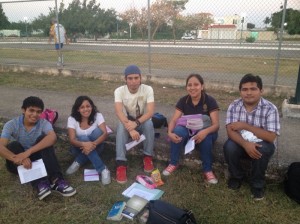 Reading John 1 was particularly significant for me. When I first read this passage, I was very confused: How can Jesus be God? How can he be both a person like me and fully God? These questions made me want to investigate more.
Reading John 1 was particularly significant for me. When I first read this passage, I was very confused: How can Jesus be God? How can he be both a person like me and fully God? These questions made me want to investigate more.
As I got to know Jesus better through other biblical stories, I started to understand. My vision of the world changed and I started to believe in a personal God. I became aware of my sin and the darkness in me. And what is most important: I met the love of God through the grace and hope which he gives us in Jesus.
I’m a scientific person. I want to be sure of something before I believe in it. If somebody had shown me a miracle, I don’t think that I would have believed. But I love to read; I love words. Jesus came into my life through his Word. I discovered that all the evidence necessary to believe in Jesus is there in the Bible, the Word of God. Early 2014, I started a Bible study group in my own school (see picture).
Sara Medina, student of chemistry and physics in Mexico
(sara.medinagom (at) gmail.com)


